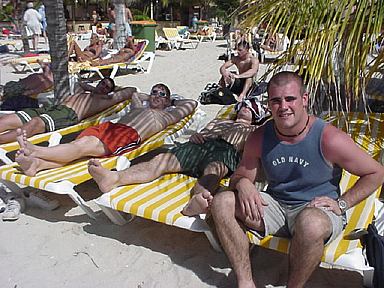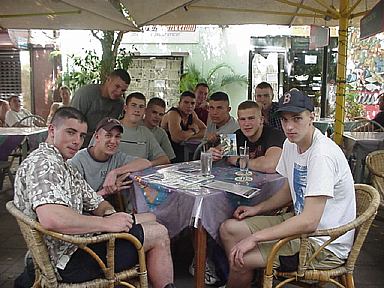
| January 2001 | ||||||
| Sun | Mon | Tue | Wed | Thu | Fri | Sat |
| 1 | 2 | 3 | 4 | 5 | 6 | |
| 7 | 8 | 9 | 10 | 11 | 12 | 13 |
| 14 | 15 | 16 | 17 | 18 | 19 | 20 |
| 21 | 22 | 23 | 24 | 25 | 26 | 27 |
| 28 | 29 | 30 | 31 | |||
At 0800 Atlantic Standard Time, 0700 Eastern Standard Time, and 1200Z, the Training Ship Empire State was moored in Willemstad, Curacao, taking various services and repairs from the pier. The weather had changed somewhat. The temperature was 78 degrees Fahrenheit, skies were cloudy; winds were from the East at 02 knots; barometric pressure was 1016 millibars. Relative humidity was 70%. AND...SHE WAS STILL THERE!
CAPTAIN'S LOG
Good Morning...And it is a good morning. I know that all are interested in the status of the electric plant and I will get to that. But, experience tells me that mail delivery may be of greater concern. I am attempting to have the mail that you sent to Costa Rica forwarded to Curacao. If that is not possible, then it will meet us in St. John. Our agent is well versed with the procedures as changing schedules are daily events in the Maritime world.
Now, to the Turbo Generator. The engineers have made considerable progress since my last report, and we are functioning in parallel paths, simultaneously completing necessary repairs and required training.
With industrial assistance from Curacao Drydock, the number two, turbo generator (SSTG) was disassembled and the failure properly evaluated. Briefly, one section of shroud was missing from the fifth row of turbine blades and pieces of the turbine blades were found in the generator casing and main condenser. The root cause of the failure has yet to be determined but the rotor and high-speed pinion were removed as a unit, and sent to the shipyard to be refurbished and balanced. The entire turbine casing was inspected and cleaned. The main condenser was also thoroughly inspected because that unit is next, downstream in the steam cycle, and debris carries over. While repairs are progressing ashore, engineers aboard are making all preparations for reassembly.
Despite the hassles caused by disruption to our schedule, the cadets are learning more than ever. Their performance is superior to that of more senior people that I have worked with. They have seemingly inexhaustible stores of energy, and they do not know the meaning of impossible. I enjoy watching them rise to the occasion and take everything in stride.
Cadets, not directly involved in the Engine room, are beginning to function and respond as any community ashore, including news coverage of worthy events. Last evening, the General Alarm (ship's newspaper) published in depth stories attributed to the Captain and the Cadet Cruise Commander. Each article focused on the changing itinerary, the effect on the cadet training, and morale. Of course, articles logically and factually written about corrective actions or critical situation, do not sell newspapers. (The paper is free) Consequently, innuendo and satire rule the day. For example, the headline "How many days left in Curacao? Forever!" or the quote of the day, "I never thought being stranded on a tropical island could be this bad", and the favorite Top Ten about being stuck in Curacao included; "Who really needs money anyway?" "Even the beach is cooler than the hold", and "One word: "Mambo", referring of course, to the alluring Latin dance.
The manner in which cadets learn to deal with the ordeals of change is important to their development and the flexibility that they learn in this situation is marketable in any workforce. Certainly, a little humor does not hurt either.
The comment "who really needs money anyway", is in response to my decision to grant liberty each evening. After one day, the Cadets' performance convinced me that we can easily meet all training objectives without keeping everyone aboard. So, off they go into the wild blue night!
Stay tuned for the extended liberty reports. They may prove more interesting than all this technical stuff anyway.

CADET COMMENTS
Cadet 2/C Megan Kearns, Trip to Curacao
While many of us were spending the days lounging on the beach, swimming, diving, and hitting most of Curacao's hot spots, our ship's finest were working hard to fix many of the problems that the ship has encountered. This has truly been an experience for all. Not only for those of us who never had the luxury of visiting a tropical island, but for all to see that things can happen when out to sea.
At sea, you must to be ready for any situation. For instance, one of our air conditioning plants failed. Sleeping in the hold was brutal. It was near 90 degrees and with everyone showering, the air became damp and thick. While sitting still, the cadets were dripping wet. (Now I know what it feels like to be a piece of steamed broccoli). Many of us chose to sleep outdoors with the nice, cool breeze. The main deck resembled a refugee camp as everyone cuddled up with pillows and blankets. "Steel beach" was not the most comfortable bed, yet it was nice to be able to breathe.

While we await the parts to fix the turbo generator and the radar, we continue our daily routines. And, although we had a great time in Curacao, we are anxious to get underway.

Cadet 3/C Angela Abbott: Turbo Generators
Our ship relies heavily upon electrical power. Electricity is necessary for all aspects of life aboard, and powers everything from refrigeration to navigation. Without electricity, we lack both necessities and luxuries, such as air conditioning and lights. A landlubber may not realize just how important lighting is aboard a vessel. But with few windows, the lack of proper lighting can put one in great danger, as well as violate safety rules and regulations put into place by the Coast Guard.
The electric plant that supplies the needs of the training ship consists of two steam turbine generators rated at 750Kw each, one emergency diesel generator at 250Kw, one Ship's Service Diesel Generator at 1200Kw, and the switchboards and distribution system.
At present, one of the steam turbine generators is experiencing problems. #2 SSTG is inoperative and appears to be out of balance, which causes the TG to vibrate as it spins. The vibration may cause very serious damage to the rotor and the bearings.
In order to fix the problem, the rotor must be overhauled and balanced. Engineers on the ship, attempted to repair it themselves. However, when they determined that the problem could not be fixed onboard, the decision was made to send the rotor to a local shipyard. They will machine and rebalance it, re-babbitt the bearings, and restore the machine to operating condition. We are hoping that these repairs will take only a few days! In the meantime, the Engineering Department is working diligently to fix the problems.
QUESTIONS FOR THURSDAY 25 JANUARY
MATH:
Cadet Wickert went shopping for gifts. She found a necklace originally priced at $21.00 on a 40% off sale, a bracelet originally priced at $16.00 with 20% off, and sunglasses priced at $19.95 at 50% off. How much did she pay for the gifts? How much money did she save buying the items on sale?
SCIENCE:
Global Warming and the greenhouse effect may be caused by the build-up of a very common gas in the atmosphere. What gas is it?
GEOGRAPHY:
The country of Costa Rica is located in the Tropics. How many degrees North of the Equator is the country[base ']s southern border? Its northern border?
HISTORY:
Who were the first human inhabitants of many of the Islands of the Caribbean?
ANSWERS FOR WEDNESDAY 24 JANUARY
MATH:
A2 + B2 = C2
10x10 + 15x15 = SQ. ROOT OF 325
C = 18.02 nautical miles
SCIENCE:
True. Fissure Eruptions. They most often occur on the ocean floor.
GEOGRAPHY:
False: The dry season occurs during the months of December through April
HISTORY:
The President of Costa Rica is President Miguel Angel Rodriguez. His term expires on 02 February 2002. He was elected to a four-year term in office.